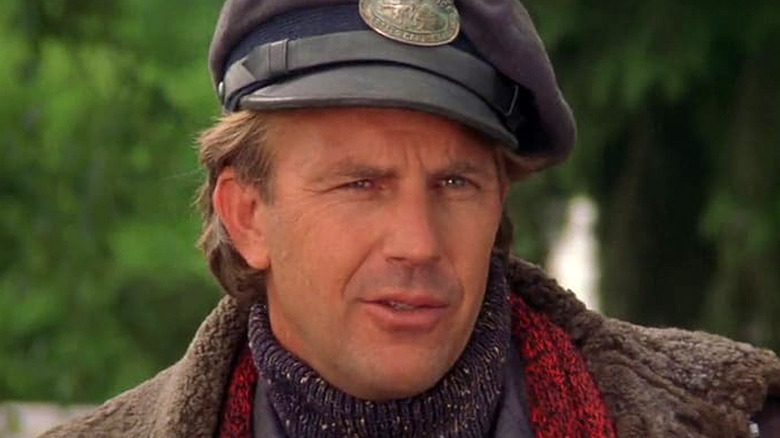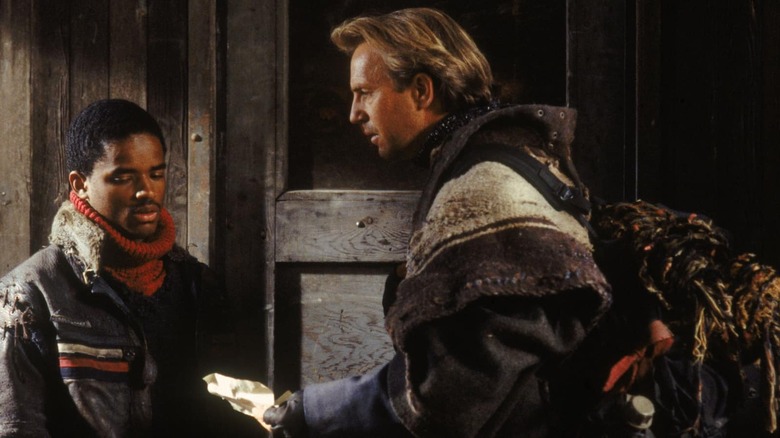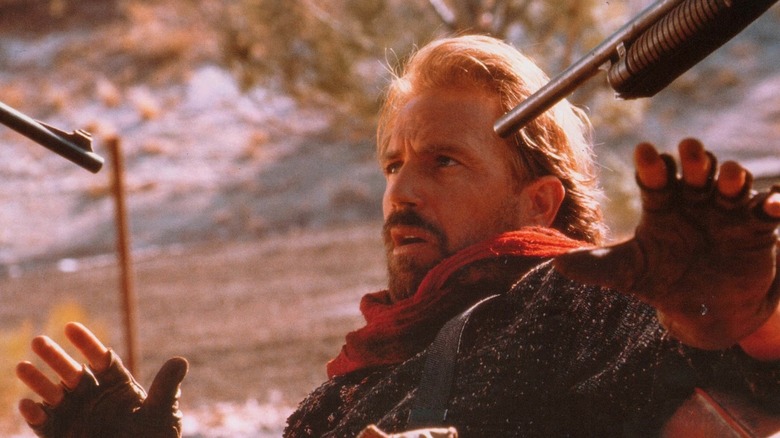Kevin Costner Thinks A Simple Change Might Have Saved The Postman
The mid 1990s were a wild ride for fans of Kevin Costner. Lawrence Kasdan's 1994 film "Wyatt Earp," often seen as the longer, more turgid version of "Tombstone," was not entirely well-received and lost a boatload of money. A down! He followed it that same year with an intimate veteran drama called "The War," opposite a young Elijah Wood, who received a good deal of praise for his performance. An up! He then made, ahem, a splash with the overwrought and notoriously expensive "Waterworld" in the summer of 1995. "Waterworld," more or less a "Road Warrior" knock-off but at sea, was the most expensive film in history up the that point. It ended up breaking even. It was a blot on Costner's career. A down! Luckily, he chased "Waterworld" with the acclaimed golf romcom "Tin Cup" in 1996. An up!
Then, on Christmas Day in 1997, Costner — working from a script by Eric Roth and Brian Hegeland — directed his second feature film, "The Postman." It was most decidedly a down.
"The Postman" is a sci-fi western that takes place in the far-flung future of 2013. An unnamed apocalyptic event wiped out the world, followed by a plague that wiped out a chunk of our species. Humanity now lives on a dusty, desert world absent of technology. A dangerous, gun-loving Christofascist militia has risen to power, led by the deliciously evil Will Patton. Costner plays a onetime Shakespearean actor who, over the course of the film, discovers a cache of undelivered letters from the Before Times. He takes it upon himself to deliver the letters, slowly becoming a modern-day folk hero. Others join his cause, threatening the fascists.
"The Postman" cost $80 million. It made less than $20 million.
Once upon a time
When 2013 finally rolled around, the Huffington Post interviewed Costner about his new film "Man of Steel," but also other notable films of his such as "Bull Durham" and, yes, "The Postman." Costner was nostalgic about "The Postman," and had given the film a lot of thought since its release. Costner was now open to talk about the decisions he had made, as well as some of the mistakes. Costner still loves "The Postman," but also knows that it was 1. ahead of its time and 2. lacking in an appropriate framing device. A story of a Johnny Appleseed-like American folk figure needed, he figured, a fairy tale opening.
He also mentions the film's ending, so the following statement comes with a spoiler warning. Costner said:
"I always thought it was a really good movie! I always thought I probably started it wrong. I should have said something like 'Once upon a time.' Because it was just like a modern-day fairy tale — it wraps itself up with a storybook ending with the statue. You know, I thought it was a pretty funny movie set against the idea of a Superman; [of] somebody "stepping up." But in [the Postman's] case, it's a very humble guy whose nothing but a liar. [He] delivers mail, and burns half of it just to stay alive. So, I like the movie."
"The Postman," it should be noted, was panned upon its release, and it currently holds a mere 8% approval rating on Rotten Tomatoes. Many critics responded quite poorly to the film's corny earnestness, Costner's own ego-driven mythmaking, and the film's tendency toward hokey Americana. A "once upon a time" opening could only have helped, cluing audiences into the film's unreality.
Ahead of its time
The Huffington Post interviewer — a fan of "The Postman" — seems to think that the film was merely ahead of its time. The 1990s weren't a great time to excoriate the virtues of old-world American institutions. Indeed, films like "Fight Club" and "American Beauty" existed to criticize and dismantle them. Had "The Postman" been released in the 2010s — the age of films like "American Sniper" and the pro-military Marvel movies — perhaps it might have been more successful. Costner couldn't speak to that particular what-if scenario — it's mere speculation — but he would be eager to see what a modern audience would think. Costner said:
"I don't know ... I know that if you revisit the movie, that's a good thing to do. You can go back and revisit some movies that made well over $100 million and you might not care anything about them. And you can go back and maybe review a movie like that ... You know, it was a pretty big, epic movie."
Costner is right. In 2000, the highest grossing film of the year (domestically) was Ron Howard's abysmal "Dr. Seuss' How the Grinch Stole Christmas." A big, glittering no-prize will be awarded to anyone who holds "Grinch" as their favorite holiday classic. Meanwhile the subgenre of online "[Film] is Good Actually" essays continues to thrive, and indeed, "The Postman" has seen a miniature wave critical reevaluation here and there.
In an age when the U.S. Postal Service is under threat, perhaps "The Postman" is more relevant than ever.


